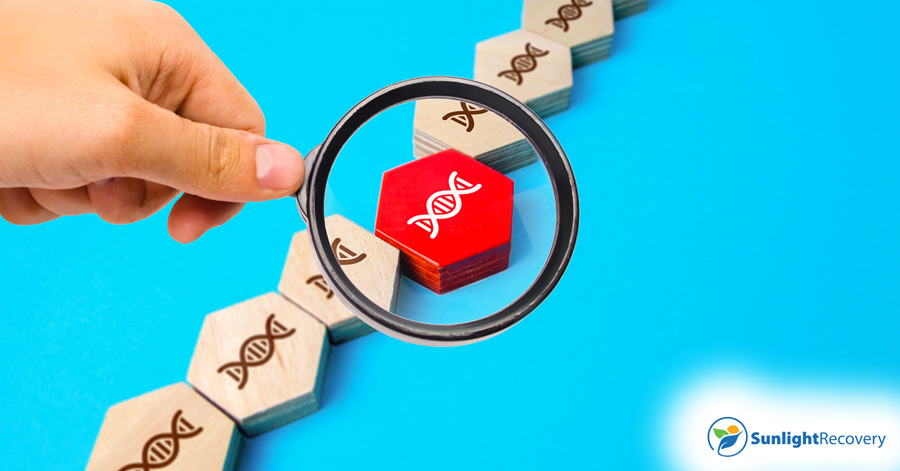If you grew up having someone in your biological family who suffered from an alcohol use disorder, you likely have many questions, concerns and fears. Alcoholism can devastate a family, leading to worse outcomes in school, professional success and relationships.
As such, if you’re related to someone who suffers from this disorder, you may be wondering: Is alcoholism genetic? What are the genetic factors that can lead to someone becoming an alcoholic? Is alcoholism hereditary, and does alcoholism always run in the family?
The answer is complicated. Multiple studies have found genetic components to alcoholism. However, the relationship is much more complex than genetics, and many other factors play a role in the development of alcoholism. Furthermore, though alcoholism can be genetic, having an alcoholic in your family doesn’t guarantee you’ll develop an alcohol use disorder.
Is There an Alcoholic Gene?
It would be inaccurate to say there’s an alcoholic gene, or a gene that triggers an alcohol use disorder. However, some genes can increase the likelihood of someone developing an alcohol use disorder.
Two specific genes have the biggest impact on the development of alcoholism: ADH1B and ALDH2. These genes impact the metabolism of alcohol in your liver. Carrying even one of these genes can increase the odds of someone developing an alcohol use disorder.
However, they aren’t the only genes contributing to the risk of developing an alcohol use disorder. Others include:
- GABRA2, which has been found in disproportionately high levels in individuals of African or European descent
- CHRM2, which has been associated with alcohol dependence
- PECR, which was found in many German individuals who suffer from an alcohol use disorder
- KCNJ6, which is related to cognitive deficits often found in people who suffer from alcoholism
- AUTS2, which has been found in both men and mice with alcoholism
- IPO11-HTR1A, which has been linked to numerous addictions, including alcoholism
As you can see, numerous studies have correlated alcoholism and the presence of specific genetics. What is less clear is how these genes interact with each other or why some individuals still won’t become alcoholics even if they have one or more of these genes.
Finally, it’s worth noting that many individuals become alcoholics even with no genetic predisposition to alcoholism. This is a crucial point: Alcoholism can exist without a genetic predisposition and fail to materialize in predisposed individuals.
The numerous studies on this issues have concluded that genetics can increase the odds of an alcohol use disorder but make no guarantee of developing one.
Is Alcoholism Genetic?
As noted by the National Institute on Alcohol Abuse and Alcoholism, genes are responsible for about half the risk of developing an alcohol use disorder.
Studies have examined the specific impact of genetics and found that it plays an important role. For example, among adopted individuals, the history of alcoholism in biological parents is more impactful than in adopted parents. This suggests a high importance in terms of the genetic role of adoption. Twin studies have also found that genetics can have 45% to 60% of influence in the emergence of an alcohol use disorder.
However, having a family member with an alcohol use disorder is no guarantee that an individual will develop the disorder. The fact that genes are responsible for only 50% of the risk is proof of this reality. This means that a person is not fated to be an alcoholic, even if they have genes that predispose them to alcoholism.
Why Is Alcoholism Called a Family Disease?
Alcoholism is called a family disease because of the evidence that links family prevalence to the development of the disorder. Individuals with alcoholism in their family are more likely to develop an alcohol use disorder independently. However, in this instance, it’s more than just the role of genetics.
Multiple studies have found that family can impact the development of an alcohol use disorder in many ways, including:
- Passing along a predisposition to the disease
- Creating a social environment in which alcohol consumption, at healthy or unhealthy levels, is accepted and tolerated
- Encouraging or discouraging an individual from seeking treatment when needed
- Creating traumatic circumstances that can make an individual more likely to become an alcoholic
As noted above, the fact that studies of adoptees have found that individuals are more impacted by their biological parents than their adopted ones is further proof of this unfortunate reality.
However, alcoholism’s family connections go beyond genetics. The environment that family creates can increase the likelihood of someone becoming an alcoholic as well. Family counseling is often a critical component of alcohol use disorder treatment.
What Is the Environmental Impact of Alcoholism?
As noted above, changes in the environment or the way someone is raised can absolutely contribute to the development of alcoholism. Consider what numerous studies have found in the development of alcoholism.
For instance, a 2011 study found that various environmental factors, including “a permissive environment, cheap alcohol availability, poor cleanliness, crowding [and] loud music,” were associated with an increase in alcohol consumption and alcoholism.
Trauma has also been deeply correlated with alcohol use disorder, with numerous studies finding that a traumatic event — such as experiencing a sexual assault, being a victim of a crime or serving time in the military — led to an increased chance of developing an alcohol use disorder.
Additional environmental factors, such as poverty, the availability of alcohol and work-related stress, have all been linked to excess alcohol consumption.
At the same time, many individuals experience the above factors and don’t become alcoholics. This is where the role of genetics may come into play. So, is alcoholism hereditary? The answer is yes — but it’s more complicated than that.
Still, someone who experiences both environmental and genetic factors is more likely to suffer from an alcohol use disorder and need professional treatment to recover. Regardless of the cause, if you or a loved one is suffering from alcoholism, it’s never too late to get help.
Sunlight Recovery offers a wide range of programs that can help you get the treatment you need and assist you in getting your life back on track. Contact us today to get started.






